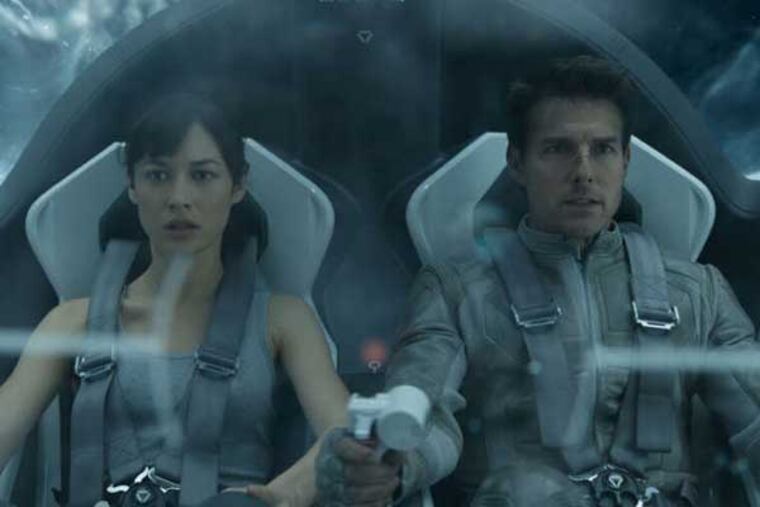'Oblivion': Handsome Cruise to nowhere
"Oblivion" stars Tom Cruise as an omega-man mercenary preparing to depart an Earth evacuated of all humans. Or is it? Gorgeous but goofy sci-fi.

"OBLIVION" is a sci-fi spectacle that also neatly functions as a psychodrama about the place that Hollywood superstars fear they might end up.
The superstar in question is Tom Cruise, bankable enabler of this lavish and visually stunning tale, set on a post-apocalyptic earth six decades hence.
Humanity has fled to one of Saturn's moons. A few humans remain to safeguard the machines that are sucking up ocean water to power our new home. One is Jack (Cruise), a combination maintenance man/mercenary who hunts down troublesome scavengers, remnants of an alien race that attacked the Earth and nearly destroyed it.
For the first hour or so, here's what you see: Tom Cruise riding a space-age, tilt-rotor Osprey aircraft, Tom Cruise riding a space-age motorcyle, Tom Cruise retiring to his fantastic condo, an eagle's nest of solitary cool perched thousands of feet in the air - where the Jetsons might have lived had they been the gated-community type.
So, it's all Tom, all the time, and "Oblivion" becomes the quintessential blockbuster star turn: a massively expensive spectacle featuring, essentially, one dude.
Jack isn't completely alone - he has a girlfriend (Andrea Riseborough), but she mainly exists to invite Cruise into a lap pool for shirtless swimming.
At this point, there is just the barest suggestion of a plot (or a cast). Jack knows that his memory has been wiped (including, one hopes, all recollections of "Rock of Ages"), but blips and flashbacks (of Olga Kurylenko) give us a whiff of hidden secrets that explain Jack's history, the recent history of the Earthand possibly its future. (The key-holder, explainer of all, is a typecast Morgan Freeman.)
As you may have guessed, "Oblivion" makes no claim for originality. It plainly cribs from "Total Recall." It steals its devil-red computer eyes from Kubrick, sound effects (and sand people motiffs) from "Star Wars," its plot from "Wall-E" and a half dozen others.
And there is a major borrow from a recent sci-fi indie gem, the sort of movie one might call overlooked, except that it's clear the screenwriters haven't overlooked it.
And yet the borrowing in "Oblivion" is clever and respectful, and the movie is beautiful on its own terms. The machines look as though they were designed by Jobs-era Apple - sleek, white, spiffy, functional. I particularly liked the flying drones - deadly, round, future-world predators with machine-gun arms and, somehow, angry little faces.
I liked them so much I ended up rooting for them.
For Jack, not so much - even after the movie drops its big reveals and gives us a reason to care about him. I was more interested in what the twists had to say about the movie's star - so unnaturally youthful at 50.
How does he do it? It's not the cosmetic surgeon. It's more like sheer force of will, a fierce determination to outperform and outlast all imitators, though they may be legion.
The ending, which struck me as hilarious (although I was the only one laughing), wraps Jack's story and the Cruise psyche in one tidy package.
Speaking of endings: In this postapocalypse, set sixty years after the abdication of Man, brace yourself for the worst Coca-Cola product placement ever.
Online: ph.ly/Movies